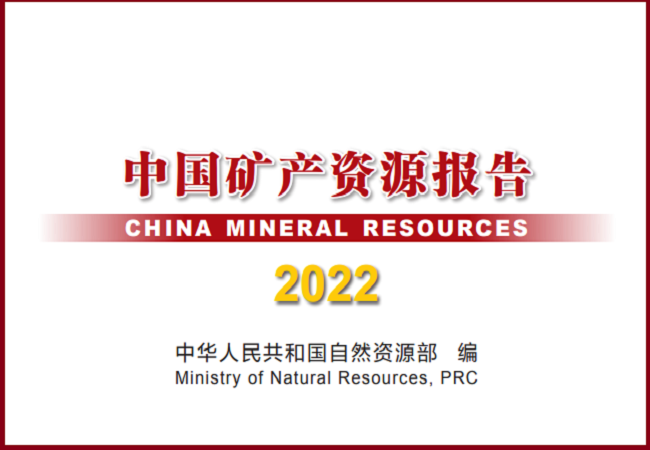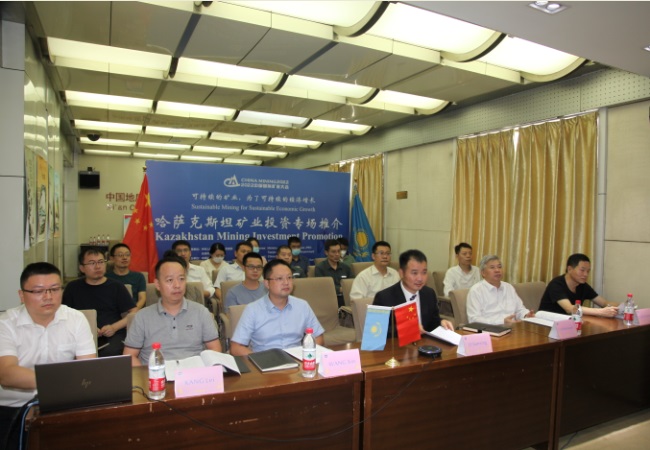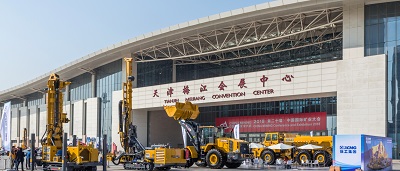9月20日,自然资源部部长王广华在京会见白俄罗斯自然资源和环境保护部部长安德烈·胡迪克(Andrei Khudyk)一行,双方围绕进一步加强两国间地质矿产领域合作交换了意见并达成共识。
9月18日上午,中国国际矿业大会组委会主席、中国矿业联合会会长彭齐鸣会见了来访的沙特阿拉伯工业和矿产资源大臣班达尔•胡莱夫(Bandar bin Ibrahim Al-Khorayef)一行。
9月18日,自然资源部部长王广华在京会见沙特工业和矿产资源大臣班达尔•胡莱夫(Bandar bin Ibrahim Al-Khorayef),双方围绕进一步加强在地质矿产领域的合作交换意见并达成共识。中国地质调查局局长李金发、沙特驻华大使阿卜杜拉赫曼•哈勒比(Abdulrahman bin Ahmad Al-Harbi)参加会见。
各有关单位:
根据最新情况变化,原定于2023年10月19至21日在天津梅江会展中心召开的2023(第二十五届)中国国际矿业 大会,调整为10月26至28日召开,其他事项不变。
因矿业大会日期调整给各相关单位和各参展参会代表 带来的不便,敬请谅解。
特此通知。
9月16日,由北京市人民政府、国务院发展研究中心、国务院国有资产监督管理委员会、自然资源部中国地质调查局共同举办的,以“能源安全 绿色转型”为主题的2023全球能源转型高层论坛在京举行。
9月19日,第七届中阿能源合作大会在海南省海口市拉开帷幕。本次大会旨在有效落实2022年12月中国-阿拉伯元首峰会、中国-海合会国家峰会、中国-沙特元首峰会精神,切实推动我国与阿拉伯国家在能源领域的务实合作。海南省省长刘小明、国家能源局局长出席开幕式暨主题论坛。
9月14日,李四光地质科学奖委员会在京完成换届,选举产生李四光地质科学奖第十届委员会暨基金会第五届理事会组成人员。自然资源部党组书记、部长王广华当选第十届委员会主任。自然资源部党组成员、中国地质调查局局长李金发主持会议。
9月13日,在中华人民共和国政府和委内瑞拉玻利瓦尔共和国政府高级混合委员会第十七次会议全体会议暨闭幕式上,自然资源部中国地质调查局与委内瑞拉国家地质矿产局签署了地学合作谅解备忘录。中国地质调查局局长李金发和委内瑞拉生态矿业发展部副部长、委内瑞拉国家地质矿产局局长亚历杭德罗·马丁内斯(Alejandro Martinez)代表双方签字。
当前,工业生产继续恢复,多数行业增速加快。国家统计局最新发布的统计数据显示,8月份规模以上工业增加值同比实际增长4.5%,环比增长0.5%。其中,采矿业增加值同比增长2.3%,增速较上月加快1个百分点。1~8月份,规模以上工业增加值同比增长3.9%。
在9月17日于北京闭幕的2023年世界地热大会上,国际地热协会(IGA)面向全球正式发布《中国地热供暖推荐做法》行业标准。这是全球地热领域发布的第一项行业标准,对推动全球地热行业的标准化、规范化发展具有重要意义。
近年来,在新疆塔克拉玛干沙漠腹地,中国石油塔里木油田不断挑战深地极限,目前成功钻探超8000米超深井104口。这些都为万米深井工程提供了充分的基础条件、技术准备和经验积累。
国家统计局最新发布的数据显示,7月份,规模以上工业增加值同比实际增长3.7%。7月份全国规模以上工业增加值同比增长3.7%,较上月增长0.01%。其中,采矿业增加值同比增长1.3%。






























